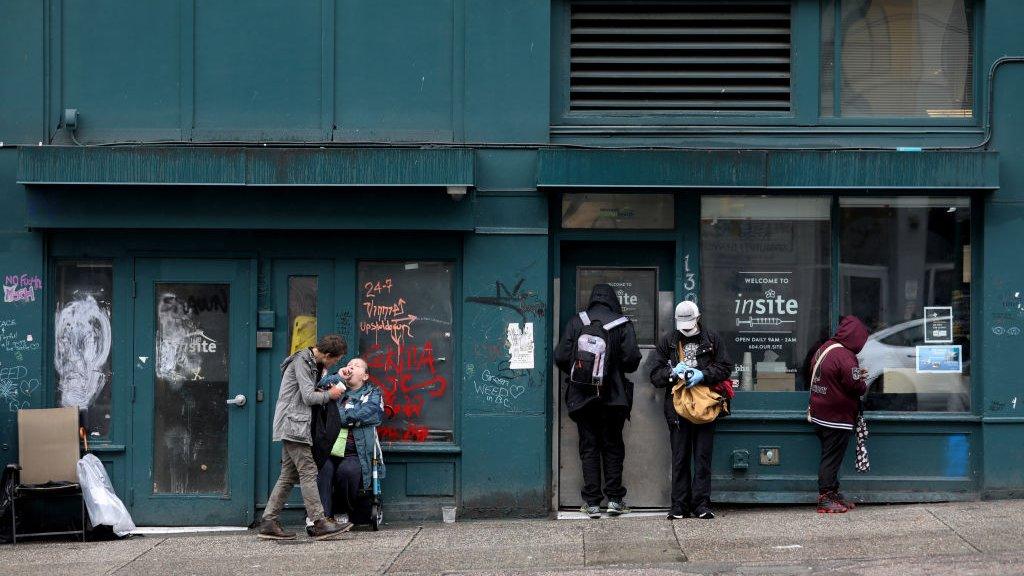Welsh billionaire Michael Moritz criticised over anti-drug posters
- Published
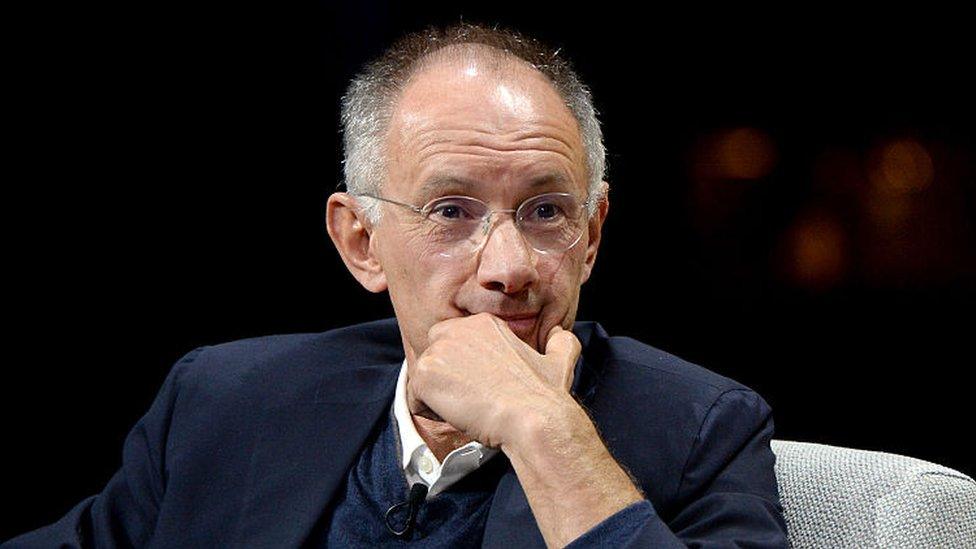
Cardiff-born Sir Michael Moritz began his career as a journalist for Time magazine and wrote the first biography of Steve Jobs and Apple in 1984
A Welsh billionaire has been criticised over a "misguided" poster campaign aimed at heavier enforcement of laws against drug users and dealers on the streets of San Francisco.
Michael Moritz is a funder of Together SF, whose poster campaign called for an end to open-air drug markets and more city-sponsored recovery programmes.
The posters were graffitied and some have labelled the campaign "misguided".
Sir Michael and Together SF have been contacted for comment.
Sir Michael was born in Cardiff and moved to the States after graduating from Oxford in 1974. He made his fortune after investing in tech start ups such as Google and PayPal.
Some online have claimed the Together San Francisco project was "shaming" drug and Narcan (a brand of anti-opiate drug naloxone) use and calling for the "criminalisation of poor people".
The alleged graffiti artists wrote, external: "Under the cover of night, with the Frisco fog as our accomplice, a crew of friends vandalised over 10 of the right-wing, pro-police 'Fentalyfe' street poster installations."
San Francisco 'has problems with drug addiction'
The anonymous blog posters claimed they painted messages such as "Narcan saves lives", "cops kill people" and a message against Mr Moritz.
In February, Sir Michael wrote an article for the Financial Times, external saying San Francisco "bans plastic straws but permits plastic needles".
He also claimed the Californian city saw more deaths from drugs than Covid between 2020 and 2022 and said any attempt to combat the city's problems would be "fruitless" without handling drug problems.
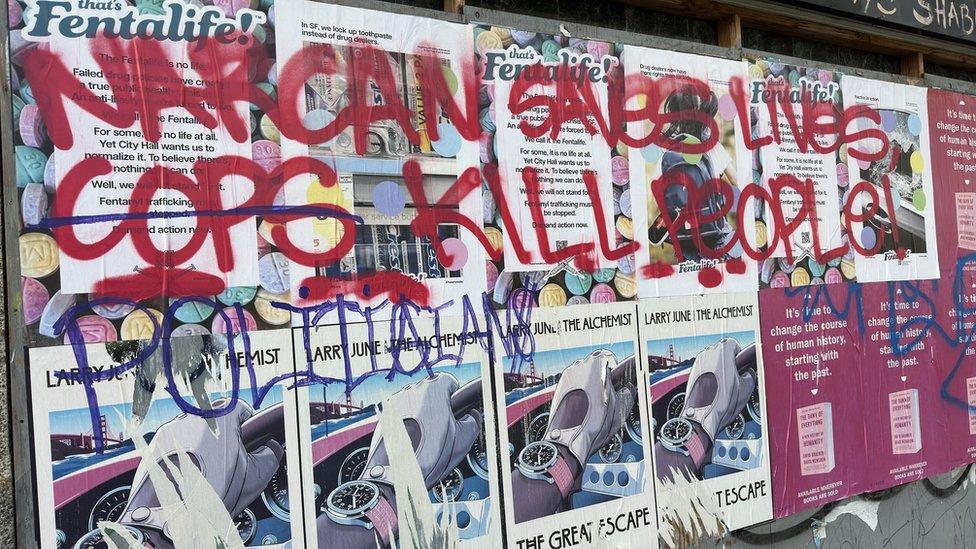
An anonymous group graffitied the posters
Sir Michael also wrote that the drug fentanyl - a synthetic opioid 50 times more powerful than heroin - had turned many of the blocks of the city into "zombie zones".
"Beyond the shocking waste of potential, the drug use and homeless tents consume an enormous part of San Francisco's annual $13.95bn (£11.1bn) budget," he said.
"Direct city spending on homelessness has risen from about $200m (£160m) for the fiscal year 2016 to $680m (£543m) this year."
San Francisco journalist Christopher Cook has lived in the city for 30 years and said "nobody in the city denies that there are issues and problems on the streets with fentanyl and homelessness and drug addiction".
"It's very clear there's a lot of suffering and tragedy in the streets," he said. "The issue is how are we going to deal with it? What's causing these problems?"
He claimed Sir Michael and the campaign group had "fomented ... a really misleading narrative that somehow a handful of progressive supervisors, local legislators are somehow to blame for this huge crisis that is national in scope".
Mr Cook said the tech billionaire had been "one of the major funders for this whole reactionary movement" and the benefits homeless people get are "enough to barely keep them alive".
He added that "the solution isn't to throw them in jail", where overdose rates are higher.
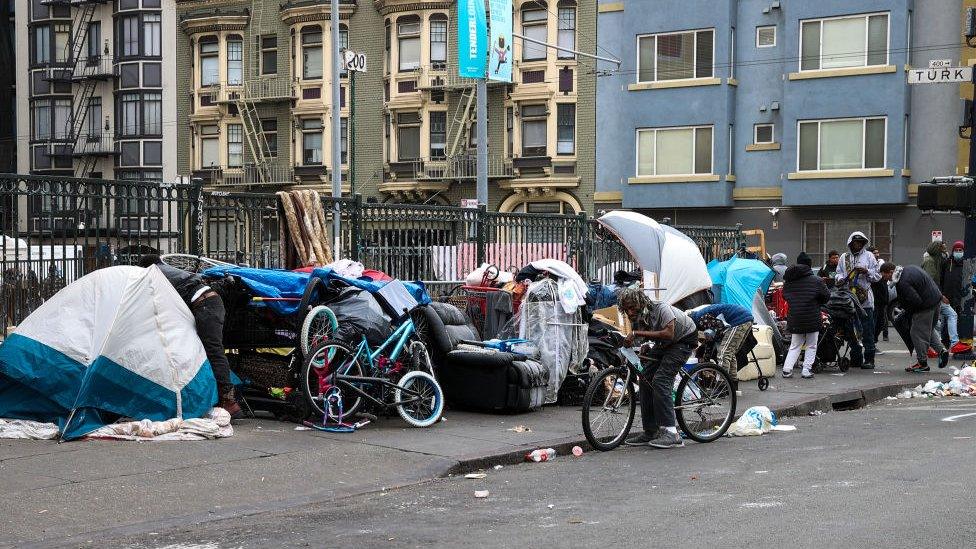
Christopher Cook says the authority raids on homeless settlements are "incredibly destructive"
"What many of us would propose is expanded treatment on demand in the streets, combined with fully supportive housing where people have somewhere to stay, not just a shelter overnight."
He said shelters were often "very dangerous places", leaving people "to fend for themselves" outside.
The San Francisco resident added homelessness was "a systemic problem in America".
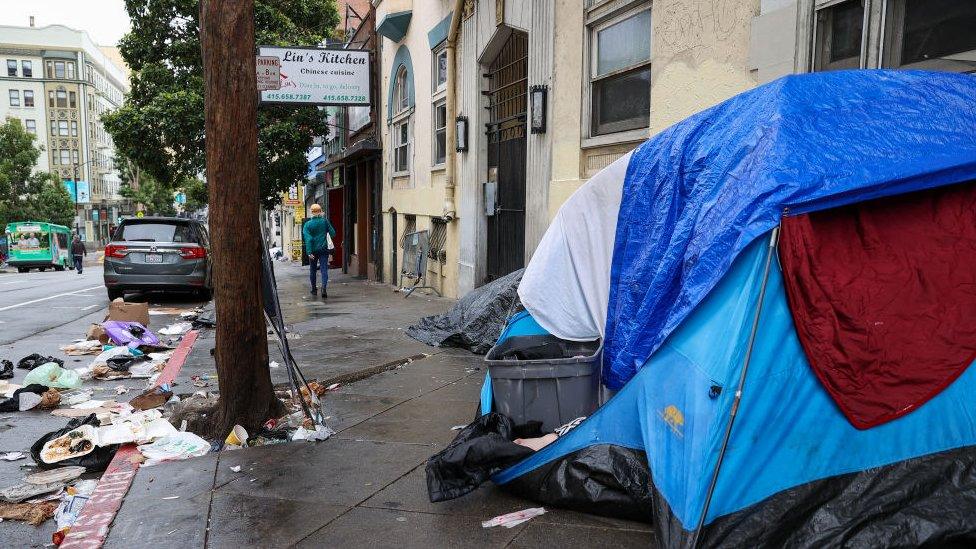
California's homeless population grew by 22,000 over the Covid pandemic, according to CalMatters
Mr Cook said the city had changed a lot in the 30 years he has lived there.
"The largest change has been city-wide massive gentrification which has displaced literally thousands of people."
He said "working people" could not afford to live in the city because "basic level apartments [are] going for $2,000 to $3,000 a month (£1,600 to £2,400) [for] a one-bedroom studio".
Mr Cook added: "The ad campaign seems incredibly tone deaf and simplistic."
Although the ad campaign calls for funding to treat substance abuse, it attacks City Hall and the "very people" who are "the strongest supporters of expanding treatment", said Mr Cook.
"Together San Francisco and Michael Moritz and these other allied groups have consistently promoted more police presence, more policing of the problems on the streets and arresting users, drug addicts and forcing people into treatment."
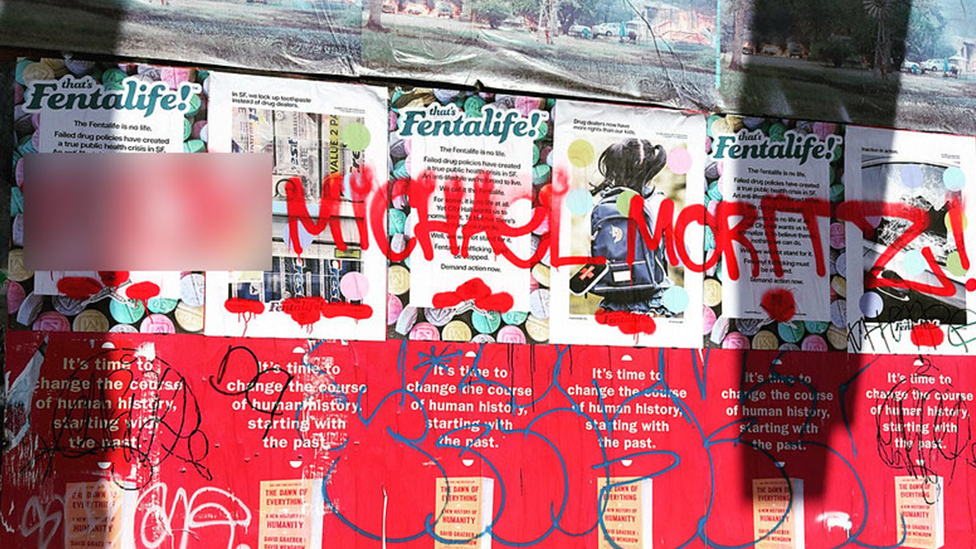
The graffiti artists painted messages against Michael Moritz
He added drug addiction and the homelessness crisis were "not entirely the same thing".
"[Sir Michael] is blaming all the wrong sources."
Mr Cook added critics should be willing to pay higher taxes to fund drug treatments.
Together San Francisco and its sister group Together SF Action are non-profit organisations demanding better governance from their elected officials.
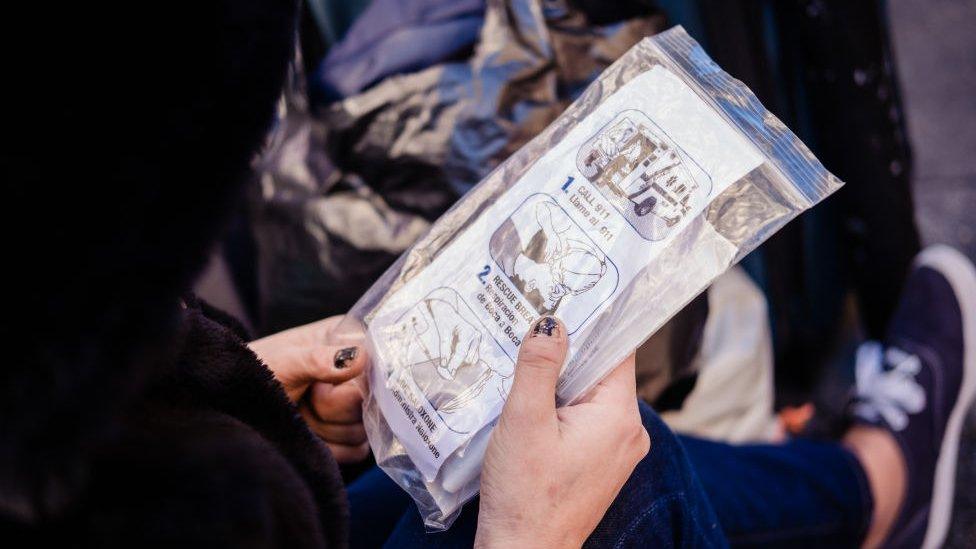
Narcan, fentanyl detection packets and tinfoil are handed out to drug users in need as a part of outreach on the streets of San Francisco
Its website says it refuses "to stand by while our city faces rising homelessness, out-of-control housing costs, a drug epidemic, and failing schools".
Together SF Action was started, it says, "to unite and empower people who are tired of being told those issues are too complicated to solve".
Sir Michael and Together SF have been contacted for comment.
- Published13 January 2023
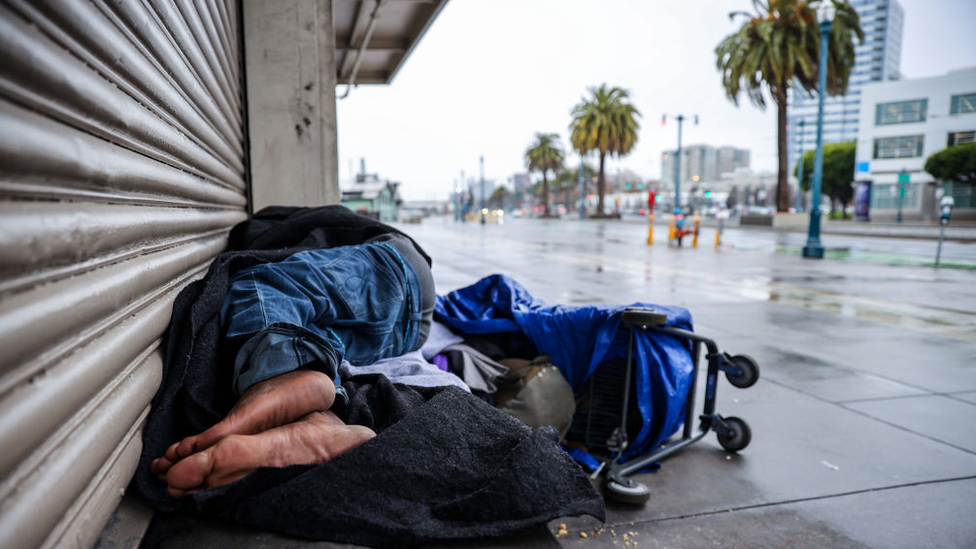
- Published12 June 2022
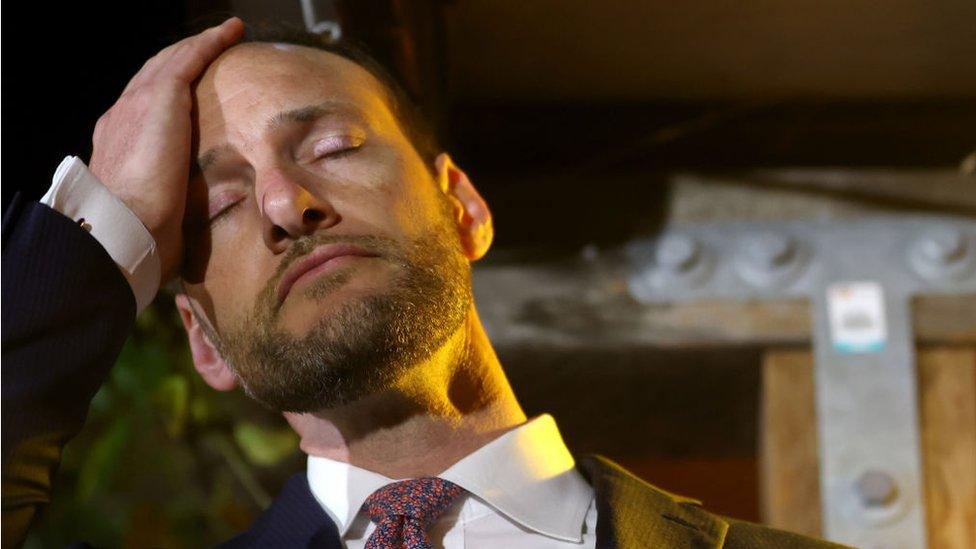
- Published19 January 2023
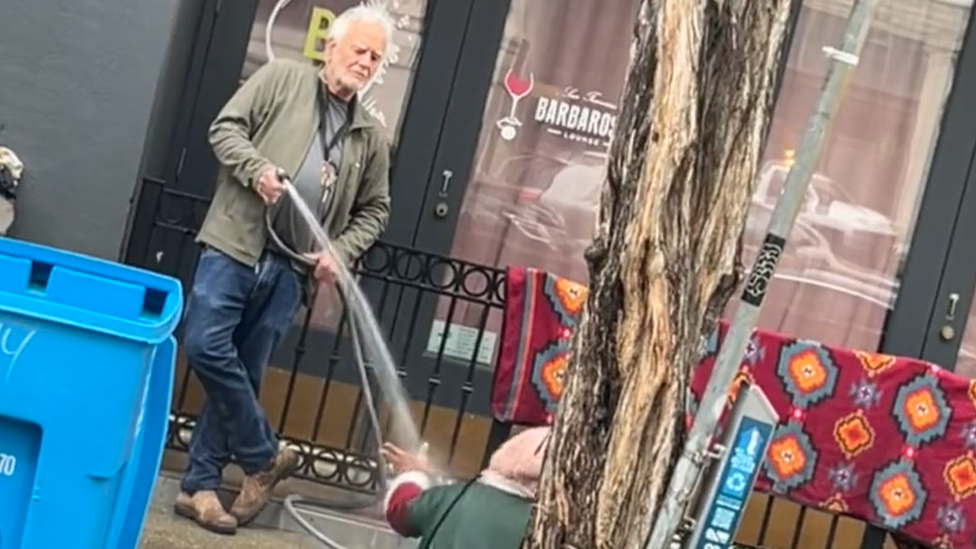
- Published5 May 2023
